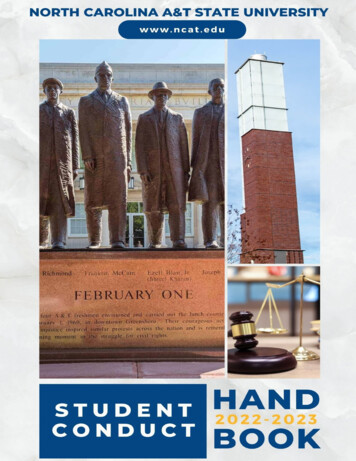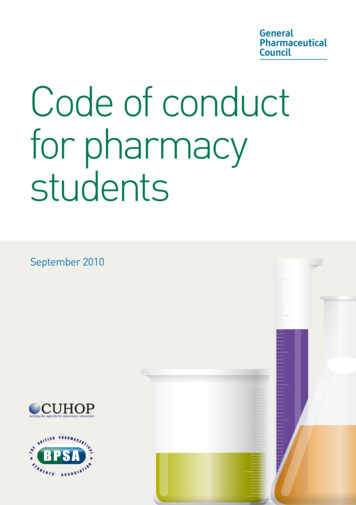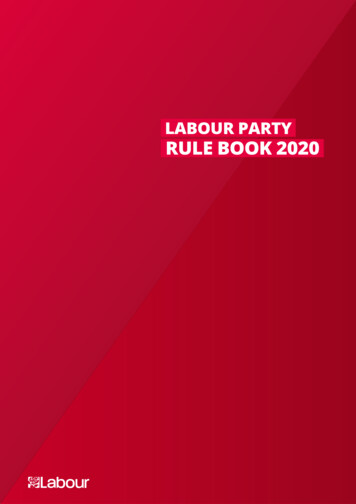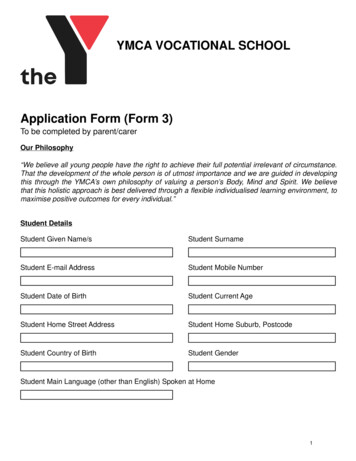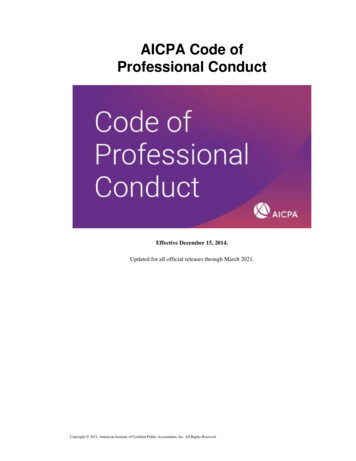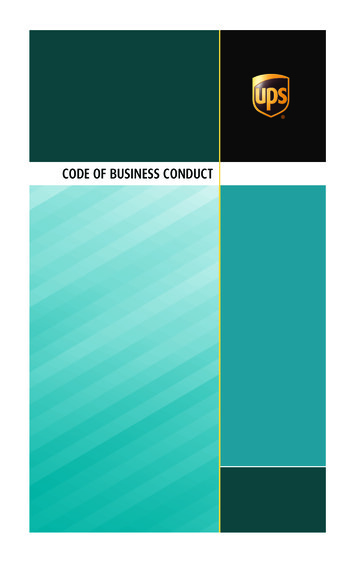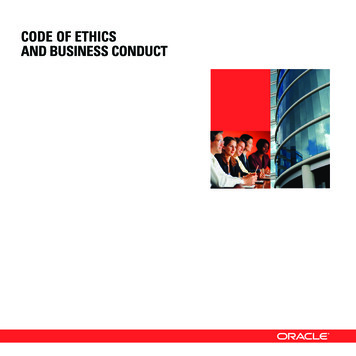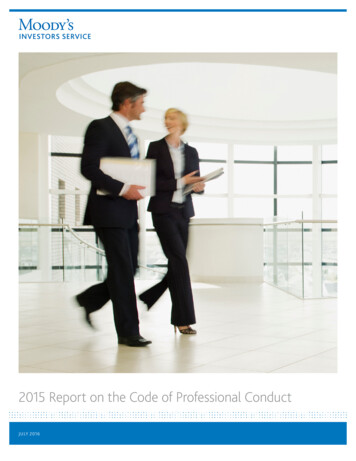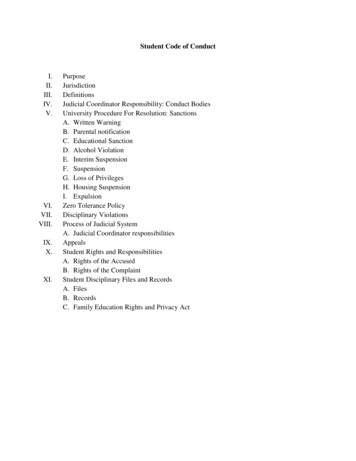
Transcription
Student Code of risdictionDefinitionsJudicial Coordinator Responsibility: Conduct BodiesUniversity Procedure For Resolution: SanctionsA. Written WarningB. Parental notificationC. Educational SanctionD. Alcohol ViolationE. Interim SuspensionF. SuspensionG. Loss of PrivilegesH. Housing SuspensionI. ExpulsionZero Tolerance PolicyDisciplinary ViolationsProcess of Judicial SystemA. Judicial Coordinator responsibilitiesAppealsStudent Rights and ResponsibilitiesA. Rights of the AccusedB. Rights of the ComplaintStudent Disciplinary Files and RecordsA. FilesB. RecordsC. Family Education Rights and Privacy Act
Central State University: Student Code of ConductSection I-PurposeThe primary mission of the Office of Student Judicial Affairs is to support the larger mission ofboth the University and the Division of Student Affairs. Student Judicial Affairs seeks topromote student learning, growth and development by increasing student awareness of theUniversity’s expectation(s) of behavior and collaboratively working with other departments in aneffort to create a safe, secure, and civil environment conducive to learning. Additionally, the areaexists to administer a fair student disciplinary process that adheres to prescribed standards.The Code applies to Central State University undergraduate, graduate, and professional studentsand all student organizations. A student shall be responsible for his/her conduct from the time ofapplication for admission through the actual awarding of a degree. Students will also be heldaccountable for their conduct, even though the behavior may have occurred before classes began,after classes ended, or if it was discovered after the student graduates. Additionally,inappropriate behavior during the academic year, between academic terms or during periods ofsuspension is not permitted. All policies, processes and procedures outlined in the Code shallalso apply to a student’s conduct even if the student withdraws from school while a disciplinarymatter is pending.A student organization shall be responsible for the conduct of its members from the time ofapplication for recognition until such time as they are no longer recognized by the Office ofStudent Activities. Organizations and/or its individual members shall be held accountable fortheir conduct, even though the behavior may have occurred before classes began, after classesended, or if it was discovered after the student graduates. Additionally, inappropriate behaviorduring the academic year, between academic terms or during periods of suspension is notpermitted. The Code shall apply to an organization even if the organization disbands while adisciplinary matter is pending.An organization may be held responsible for a violation of University policy or rule when:1. One or more of its officers, members, or authorized representatives acting as a member ofthe organization commit the violation;2. The misconduct occurs at an event that is sponsored, financed, or endorsed by anorganization where it is reasonable to believe that the organization’s members knew orshould have known that one or more of the participants engaged in conduct that is inviolation of this Code;3. The misconduct occurs on the premises owned, leased, or operated by the organizationwhere it is reasonable to believe that the organization’s members knew or should haveknown that one or more of the participants engaged in conduct that is in violation of thisCode.Section II - JurisdictionThe Code of Student Conduct and discipline system outline the rights and responsibilities of2
Central State University: Student Code of Conductstudents and student organizations. This Code addresses misconduct that takes place on Universitypremises and addresses off-campus conduct when the behavior may have or has had an adverseimpact upon the University community. Procedural rights of students and student organizations,as well as possible sanctions are also enumerated within the Code.The Code also applies to University sponsored events, activities, trips, etc., which may occur offcampus. A student who violates the Code and breaks the law is subject to University, civil, and/orcriminal authorities. The University, at its sole discretion, may pursue disciplinary action againsta student while the student is also subject to criminal proceedings. The University reserves thisright even if criminal charges are pending, reduced, or dismissed.The Central State University conduct system is the responsibility of the vice president for studentaffairs. The director or designee of the Office of Community Standards and Student Conduct hasspecific responsibility for the day-to-day operation and administration of the conduct system. Thedirector or designee shall develop policies for the administration of the student conduct systemand procedural rules for the conduct of any hearing or conference that are not inconsistent withprovisions of the Code. The director or designee, in consultation with appropriate Universityofficials and students, will revise and update all regulations and processes; conduct trainingsessions for hearing officers and bodies; and manage and maintain all student disciplinary records.Under the oversight of the director or designee, other members of the University’s staff may alsohave responsibilities within the conduct system.Section III-DefinitionsWhen used in this Code the definitions of the following terms are provided for clarity andunderstanding:1. "Administrative Appeals Board" refers to the appellate body authorized by theUniversity to consider an appeal from a judicial board determination that a student ororganization has violated the Code of Student Conduct.2. “Appeal” refers to the process for reviewing a decision made of a prior administrativeor judicial hearing3. “Behavioral Standards” refers to the policies, rules, regulations, directives,resolutions, and standards approved and/or issued by the president of the Universityand the Board of Supervisors for Central State University as well as local, state andfederal laws.4. Business days" refers to those days that faculty and staff are required to work,generally Monday through Friday5. “Code of Student Conduct” refers to conduct standards set forth in writing in order togive students general notice of prohibited conduct and notice of how the Code shallbe enforced6. "Judicial board" refers to any person or persons authorized by the Dean of Students todetermine whether a student has violated the Code of Student Conduct and torecommend imposition of sanctions.7. "Judicial officer" refers to a University official authorized on a case-by case basis toimpose sanctions upon student(s) or organization(s) found to have violated the3
Central State University: Student Code of ConductStudent Code. The Director may serve simultaneously as a judicial officer, and thesole member, or one of the members, of a judicial board. Nothing shall prevent thesame judicial officer to impose sanctions in all cases8. "May" or “Possible” is used in the permissive sense.9. “Policy" refers to the written regulations of the University as found in, but not limitedto, the Code of Student Conduct, Residential Life Handbook, and the CSU Catalog.10. "Sanction" refers to the penalty or punishment for any violations of the rules andregulations set forth in the Code of Student Conduct Handbook.11. "Shall" is used in the imperative sense.12. "Student" refers to a person taking or auditing courses at the University either on afull or part-time basis or any person on the University premises or University-leasedpremises; registering as a student, camper, or special awards program attendee (i.e.,auxiliary camps, sports camps, etc.).13. "University" refers to Central State University or any division thereof includingextension courses over which the Board of Supervisors for the University System hascontrol and responsibility.14. "University Community" refers to any administrator, faculty, staff, or student of theUniversity, including all land, buildings, facilities, adjacent streets, sidewalks, andother property in the possession of or owned, used, or controlled by the Universityand the physical surroundings within close proximity of the campus.15. "University Official" refers to any person employed by the University (includingstudents) performing administrative, teaching, paraprofessional responsibilities (i.e.,administrators, faculty, staff, Graduate Assistants, Resident Assistants in residencehalls, etc.).16. "University Premises" refers to all land, buildings, facilities and other property in thepossession of or owned, used, or controlled by the University.Section IV-Judicial Coordinator ResponsibilityEach person involved in the administration of the student conduct system at Central StateUniversity will set as a goal the fair, objective, and humane approach to all cases. While consistentand equitable treatment in the disciplinary process is another goal, each case must be dealt withbased on the circumstances of that particular situation. Those involved in the conduct systemshould also be aware that their efforts are directed toward: Protecting the integrity and order of the institution. Preserving the health and safety of the University community. Educating the students involved so that they may gain insight into the reasons and consequencesof their behavior, learn self-discipline, and accept the responsibilities of membership in theUniversity community. Determine which judicial panel shall be authorized to hear each case.4
Central State University: Student Code of Conduct The Director of Student Judicial Affairs shall develop policies for the administration of thejudicial program and procedural rules for the conduct of hearings which are consistent withprovisions of the Student Code.The Judicial Board has RECOMMENDING authority in terms of sanctions. Each board hasthe responsibility of determining if a student is responsible or not responsible of violating theCode of Student Conduct. The board’s recommendations are made to the Director of StudentJudicial Affairs.The Judicial Board is the primary judicial body of the University. It has original jurisdictionover all student cases involving alleged violation(s) of the Code of Student Conduct referredto it by appropriate University officials. It also has jurisdiction over all student cases fromimmediate interim suspension.The presence of a majority of panel members shall constitute a quorum; and with a quorumpresent, the board may hear the case. The chairperson may accept substitute representativesfor regular members when it is necessary for regular members to be absent. The chairpersonshall vote in the case of a tie vote. Proxy voting shall not be permitted.When any board member is involved in or associated with a case, that person must beexcused from participation in the hearing procedures.Decisions made by the Director of Student Judicial Affairs shall be final, pending the normalappeal process. Unless the Dean has heard the case then the VP of Student Affairs hears theappeal letterThe technical rules of evidence applicable to civil and criminal cases shall not apply.Judicial Affairs Process1. Report file (“Initial Entry”) entered into Conduct Coordinator (Coco)- Police, Resident Hall Coordinator, or Faculty or Staff2. Report received “In progress” reviewed by the Coordinator for Judicial Affairs- Contact involved parties- Update case detailso Violationso Narrative/Witnesseso Judicial Checklist- Schedule administrative conferenceo Hard coy sent to address on file with registrar: Student signature required forverificationo Soft copy emailed to MYCSU account.Student Conduct Rules and RegulationsAny student(s) engaging in behavior that interferes with the safety and well-being of anymember of the University and/or that interferes with the mission, purpose, function and processof the University will be subject to disciplinary sanctions5
Central State University: Student Code of ConductAlcohol/Underage Drinking (1.01)1.01a. Persons under the age of 21 who purchase or attempt to purchase, consume, possess ortransport any alcoholic beverages1.01b: the use, consumption, possession, purchase, sale, and/or distribution of alcoholicbeverages on University property, in cars or other vehicles, or at any of the University’sactivities (whether on or off-campus).1.01c. selling or giving alcoholic beverages to a minor (under 21 years of age)1.01d. Appearing in public on the University premises while intoxicated or under the influenceof alcohol.Arson/Fire Setting (1.02)1.02a: The malicious, fraudulent, intentional or unintentional burning of property on Universitypremises. Such acts included, but are not limited to, creating fires, setting a personal fire, openflames, and/or igniting flammable materials1.02b: Willfully starting a fire in University building or on University property, which includesbut is not limited to, bonfires and cookouts, without the proper authorization of the Dean ofStudents and/or without being in compliance with local and state fire codesSetting a fire, igniting any material inside a facility (including candles and incense), arson, falseactivation of fire alarms, tampering with fire equipment, contributing to a fire or failing to reporta fire or someone involved in setting a fire are prohibited.Any student that fails to vacate a University building during a fire alarm or scheduled fire drill,or fails to vacate the general vicinity of a fire is in violation.Breaching Campus Safety or Security (1.03)1.03a: unauthorized access to college facilities; intentionally damaging door locks; unauthorizedpossession of college keys or access cards. Duplicating college keys or access cards; or proppingopen of exterior residence hall doors.1.03b: Tampering with fire safety equipment, such as fire extinguishers, smoke detectors, alarmpull stations emergency exits, or other safety equipment1.03c: Placement of equipment or vehicles so as to obstruct the means of access to or fromuniversity building or intentional obstruction of the free flow of pedestrian of vehicular traffic onuniversity premises or at University sponsored or supervised functions.Contempt of Hearing/ Judicial Process (1.06)6
Central State University: Student Code of Conduct1.06a: Failure to appear at a Pre-Administration Conference Hearing or Judicial Board Hearingafter receiving proper and timely notification1.06b: Willful disobedience to, or displaying open disrespect for a University judicial boardmember or administrative hearing officer such as the use of profanity, threatening behavior,derogatory remarks, comments, and/or gestures.1.06c: Attempting to discourage a person’s proper participation in, or use of, the conduct process1.06d: falsifying, distorting or misrepresenting information at a conduct meeting or hearing, orknowingly imitating a false.Dangerous, Threatening and/or Unsafe Behavior (1.07)Any conduct or behavior is prohibited which threatens or endangers the health or safety of anyperson in the University environment.1.07a: Participation in a campus demonstration which distrust the normal operations of theUniversity or infringers on the rights of other members of the University community. StudentAffairs officials of the University of the Campus Police are authorized to declare groups who arein violation of this policy as an unlawful assembly and order the individuals to disperse. If, aftera reasonable interval announced by the Student Affairs officials, members of the group have notdispersed, they will be issued arrested by Campus Police, issued an interim suspension ordered tobe immediately removed from the University premises1.07b: Leading or inciting others to disrupt scheduled or normal activities within any campusbuilding or area.Disorderly Conduct (1.08)1.08a: engaging in violent, abusive, indecent, profane, boisterous, unreasonable loud orotherwise disorderly conduct under any circumstance including, but not limited to, intoxicationdue to the consumption of alcohol, in which the conduct tends to cause or provoke a disturbanceor disrupts the normal operations of the University.1.08(b) Any action that causes inconvenience annoyance, or alarm to others, or which interfereswith the rights of other individuals (including the right to quiet study), disturbs the public peace,endangers personal well-being or causes a risk of/or physical harm to public or private propertyDisruptive Classroom Behavior (1.09)1.09. Ant conduct or behavior that disrupts a faculty member while teaching is a violation. Thisincludes, but is not limited to, talking in class, talking texting playing music or listening toheadphones7
Central State University: Student Code of ConductDrugs/Possession, Use or Sale (1.10)1.10 (a) The possession, use, sale, or manufacturing of marijuana or drugs such as barbiturates,amphetamines, narcotics, hallucinogens, or other addictive substance which are illegal accordingto federal and/or state law is prohibited on the campus of the University and at any Universityrelated or sponsored activities held off-campus. This includes buying, selling, possessing, orusing any drug paraphernalia. A criminal conviction for violation of federal and/or state lawgoverning the possession, use or sale of controlled substances by a University student constitutesa violation of this policy. This will adversely affect a student’s ability to matriculate at theUniversity and to apply for and be awarded Federal financial aidAny of the illegal addictive according to federal and/or state law over the five ounces constitutesa second offenseFurnishing False Information/Fraud/Forgery (1.12)1.12a Forgery of an administrative staff person, faculty member, or student’s name; alteration ormisuse of University documents, records, identification; or possession of documents and recordsbelonging to another.1.12(b): deliberate misrepresentation of facts and/or knowingly furnishing false information toUniversity departments and/or officials.1.12 (c): Use of the University’s name, image, or logo without proper authorization or with intentto misrepresent or defraud.MisrepresentationLying, misrepresenting of facts or giving false testimony to any University official is prohibited.This includes but is not limited to forging, transferring, altering, wrongfully obtaining orotherwise misusing documents including being in possession of an ID other than your ownand/or a fake ID.Misrepresentation includes but is not limited to any misuse of University funds, using theUniversity logo or name without appropriate permission and/or to falsely attribute an activity tothe University.Representing oneself as Central State University in signing a contract or agreement, falsificationof any University record or use of any computer to gain unauthorized access to an existingUniversity record is not permittedGambling or Scalping (1.13)1.13a: Gambling or shooting dice on University premises.8
Central State University: Student Code of Conduct1.13b: Re-selling of tickets to a recognized University function for a price higher than the listedprice on the ticket is prohibited.Harassment/Intimidation (1.14)1.14a: Harassment (verbal or physical) or intimidation of a University official, Judicial Officer,or Residence Life Conduct panel members.1.14b: Intimation or harassment on the basis of race, religion, national origin, age, sex, sexualorientation, handicap, or veteran status.1.14c: Verbal harassment, abusive and/or threatening language directed towards another student,faculty, staff or guests. Rape.- Forcing or coercing another to engage in the act of sexual conduct without thatperson's consent, or when the sexual intercourse is deemed without the person'sconsent because the person (victim) is incapable of understanding the nature ofthe act by reason of stupor or abnormal condition of the mind produced by anintoxicating or narcotic agent.Sexual Battery.- The intentional engaging in sexual misconduct (physical contact) with anotherwithout that person's consent or when such sexual contact is deemed offensive tothe victim.Sexual Assault.- Forcing or attempting to force another person to participate in sexual conductand/or other sexual activities against his/her will. Such misconduct includesverbal coercion, threats, and physical restraint.Peer-Sexual Harassment.- Unwelcomed and unsolicited sexual advances, requests for sexual favors or otherverbal, visual or physical conduct or communication with sexual overtones thatthe victim deems offensive. Sexual harassment includes, but is not limited to,unsolicited, deliberate or repeated sexual flirtation, advances or propositions;verbal abuse of a sexual nature; display of sexually suggestive pictures or objects;and/or offensive or abusive physical contact of a sexual nature. The University'spolicy on "Sexual Harassment" and "Sexual Assault and Abuse" strictly prohibitssuch behavior and provides optional services for any victim of such misconduct.Sexual Intercourse.- All consensual sexual activity and/or sexual intercourse (copulation) on theUniversity premises is strictly prohibited. The presence or absence of others willnot negate the seriousness of the offenseHazing (1.15)- Central State University prohibits hazing by campus groups, organizations, and/orindividuals. Any person or organization that, in the course of an individual’s9
Central State University: Student Code of Conduct initiation or affiliation into an organization, intentionally or recklessly engages inconduct that creates a risk of physical injury or mental distress to that individualor group of individuals will be in violation of the Student Code of Conduct. Anyperson suffering from an incident of hazing, witnessing an incident of hazing, orhave knowledge of an incident of hazing shall report the incident to the VicePresident of Student Affairs and Enrollment Management or the Dean ofStudents.- 1.15a the threat to inflict bodily harm or the action of inflicting bodily harm to anindividual as part of an initiation rite is prohibited.- 1.15b the forced purchase or consumption of alcohol or drugs as part of aninitiation rite is prohibited. 1.15c the forced participation in any kind of sexualactivity as a condition for affiliation or as part of an initiation rite is prohibited.- 1.15d the creation of excessive fatigue or prevention of individuals fromparticipating in classroom activities or interacting with fellow students as part ofany initiation rite is prohibited.- 1.15e Forced participation in any other activity that endangers the physical ormental health of an individual is prohibited.- 1.15f Illegal pledging or intake activity into an organization that is currently undersuspension or otherwise not legally recognized by the University is prohibited.- 1.15g illegal recruiting of any female in a court or auxiliary organization isprohibited.- 1.15h Paddling in any form, creation of excessive fatigue, creation of fear,physical or psychological shock, creation of pain or injury, harassment, and moralembarrassment. 1.15i any inductee (pledgee) who willingly participates in anyacts of hazing will also be in violation of the University’s hazing policy, andsubject to disciplinary proceedings.- 1.15j All other activities, which violate fraternal, local, state, or federal laws orthe regulations and policies of Central State University.- Inappropriate Dress Attire (1.16)Inappropriate dress attire (1.16a)Includes, but is not limited to, violation of the appropriate dress attire policy publishedwithin this document. Students may be issued a warning by University officials forviolation of the policy and those who repeatedly violate said policy will be subject todisciplinary action.Off-Campus Misconduct (1.17)The Central State University Student Code of Conduct applies to off-campus conductwhen such conduct adversely affects the CSU Community, or the offense committed is ofsuch a serious nature as to adversely affect the alleged violator’s suitability as a memberof the University community. Central State University reserves the right to conduct10
Central State University: Student Code of Conductdisciplinary investigations, file charges and impose discipline for off-campus conductwhich does any of the following:- constitutes a violation of local, state or federal law,- Indicates the student may present a danger or threat to the health or safety of thestudent or others;- Interferes with the educational interests of the University. The Dean of Students,or his/her designee, in his/her sole discretion, will decide on a case by case basis,whether the Student Code of Conduct shall be applied to conduct occurring offcampus.Physical Altercation/Violent/Threatening Behavior (1.18)1.18a the intentional use of force or violence directed upon another: Physical altercations orphysical contact, which includes, but is not limited to fighting, slapping, pushing, punchingand/or contact using a weapon of any sort for the purpose of physical abuse or violence involvingphysical contact.1.18b Offenses of violence as set forth in Section 2901.01 of the Ohio Revised Code, asamended, including but not limited to, menacing, stalking, intimidation, intimidation of crimevictim or witness, domestic violence, inducing panic, and/or inciting violence.Theft/Burglary (1.19)1.19a theft, attempted theft, or possession of stolen personal or University property.1.19b Acts of larceny, burglary, or robberyUnbecoming Behavior (1.20)1.20a any conduct or behavior that is disrespectful, absurd, and/or rude. This includes, but is notlimited to, public obscenities, lewd gestures, etc.1.20b Inappropriate sexual behavior, including sexual intercourse or any activity involving thesexual organs of males and/or females in locations on university property deemed inappropriate(i.e., buildings, grounds, vehicles, lounges, halls, etc.)Unbecoming Behavior (1.20)1.20a: any conduct or behavior that is disrespectful, absurd, and/or rude. This includes, but is notlimited to, public obscenities, lewd gestures, etc.1.20b: Inappropriate sexual behavior, including sexual intercourse or any activity involving thesexual organs of males and/or females in locations on university property deemed inappropriate(i.e., buildings, grounds, vehicles, lounges, halls, etc.)11
Central State University: Student Code of ConductWeapons/Firearms/ExplosivesThe use, possession and/or storage of firearms, ammunition, explosives, fireworks or other lethalweapons of any kind in motor vehicles, buildings or elsewhere on University premises or duringUniversity activities are prohibited. Students who violate this policy will be referred to the Officeof Judicial Affairs. The penalty for possession weapons may be subject to expulsion. If a studentis found responsible, automatic expulsion will be rendered.Specific violations of this policy include, but are not limited to, the possession, use orthreat of use of any of the following items:a. Any firearm (including any weapon or instrument from which a shot, projectile,or other object may be discharged by force, whether operable or inoperable,loaded or unloaded);b. Any toy gun which, based on color, design or appearance, would be considered bya reasonable person to be an actual firearm;c. Any deadly weapon, defined as any instrument, item, or material readily capableof causing death or serious physical injury;d. Any BB gun, pellet gun, air rifle, paint gun, sword (whether decorative or not), orother martial arts weapon;e. Any knife (other than an ordinary pocketknife carried in a closed position, with ablade of three inches or less or cutlery of a reasonable size, when used in akitchen or other food preparation area); orf. Any explosive chemical or device including a substance or a combination ofsubstances possessed or prepared for the purpose of producing a visible or audibleeffect by combustion, explosion, deflagration, or detonation, including fireworksand illegal or potentially dangerous chemicals.Note: Possession of a license to possess or use any of the above itemsshall not constitute a defense of any violation of this sectionPhysical assault and weapons policiesAssault/Battery/Fighting Assault and battery or other altercations involving physical contactendanger the health and safety of members of the university community. Prohibited behaviorincludes, but is not limited to; beatings; muggings; physical torture; or any bodily injuriesinflicted upon a person. Students who violate this policy will be referred to the Office of JudicialAffairs. If found responsible, students are subject to the following sanctionsCellular Telephones and Pagers in the Classroom (2.1)The use of cellular phones and pagers are expressly prohibited in academic classrooms andlaboratories, unless permitted by the instructor. All such telephones and pagers, audible or silent,must be kept in the “Off” position while students attend classes. Students in non-compliance maybe asked to leave the classroom immediately upon discovery of phone and/or pager use.12
Central State University: Student Code of ConductComputer Misuse (2.2)The University considers any misuse of its computer systems to be a serious offense. A studentmay not attempt to degrade the performance of the computer systems, to seek to penetrate itssecurity, or in any way deprive other users of resources or access to the computer systems.Computer and Internet - Theft/Abuse (2.3)Theft or other abuse of computing facilities includes but is not limited to: Entry into a file to use, read or alter the contents, or for any other unauthorized purpose.Reproduction or use of a copyrighted file(s).Inspecting, modifying or copying programs or data without authorization from the owner.Using the systems for commercial or other unauthorized purposes.Use of software or programs that will intentionally or unintentionally alter the configu
The Central State University conduct system is the responsibility of the vice president for student . o Soft copy emailed to MYCSU account. Student Conduct Rules and Regulations Any student(s) engaging in behavior that interferes with the safety and well-being of any
